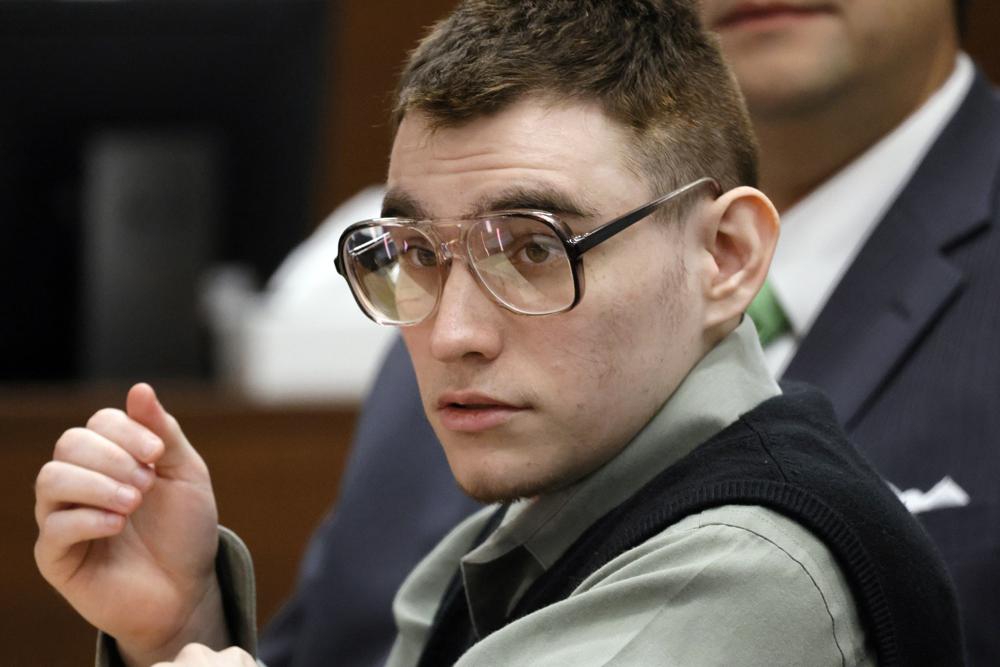The gunman who attacked the high school in Parkland, Florida, in 2018 returned to court Monday for the penalty phase of his case in which a jury will decide whether he is sentenced to death or life in prison without parole.
Nikolas Cruz, 23, pleaded guilty in October to 17 counts of first-degree murder in the deaths of 14 students and three staff members at Marjory Stoneman Douglas High School. He is contesting only his sentence. It is the nation’s deadliest mass shooting to go before a jury.
A seven-man, five-woman panel, backed up by 10 alternates, will hear the case, which is expected to last about four months. The trial was supposed to begin in 2020, but it was delayed by the COVID-19 pandemic and legal fights.
Lead prosecutor Mike Satz highlighted Cruz’s brutality as he stalked a three-story classroom building and fired his AR-15 semi-automatic rifle down hallways and into classrooms. Cruz sometimes walked back to wounded victims and killed them with a second volley of shots.
The prosecutor described Cruz as “cold, calculated, manipulative and deadly,” citing a video Cruz made three days before the massacre.
“This is what the defendant said: ‘Hello, my name is Nik. I’m going to be the next school shooter of 2018. My goal is at least 20 people with an AR-15 and some tracer rounds. It’s going to be a big event, and when you see me on the news, you’ll know who I am. You’re all going to die. Ah yeah, I can’t wait.’”
About 50 family members of the victims were in the courtroom, some couples holding hands. Some parents teared up as Satz described the deaths of their children. One mother, crying, got up and left. Others sat stoically, their arms folded across their chests.
It wasn’t clear if anyone was present to support Cruz, who sat at the defense table between his attorneys. He mostly looked down at a pad of paper with a pencil in his hand, but he did not appear to write. He would sometimes look up to stare at Satz or the jury, peer at the audience or whisper to his lawyers.
After Satz spoke, Cruz’s lawyers announced that they will not give their opening statement until it is time to present their case weeks from now. That is a rare and risky strategy because it gives Satz the only say before jurors examine grisly evidence and hear testimony from survivors and the victims’ parents and spouses.
When lead defender Melisa McNeill gives her statement, she will likely emphasize that Cruz is a young adult with lifelong emotional and psychological problems who allegedly suffered from fetal alcohol syndrome and abuse.
The shooting on Feb. 14, 2018, is the deadliest to reach trial in U.S. history. Nine other gunmen who killed at least 17 people died during or immediately after their shootings, either by suicide or police gunfire. The suspect in the 2019 slaying of 23 people at a Walmart in El Paso, Texas, is awaiting trial.
After opening statements, which are limited to 90 minutes each, the prosecutors’ first witness will be called. They have not said who that will be.
It’s the first death penalty trial for Circuit Judge Elizabeth Scherer. When jurors eventually get the case in the fall, they will vote 17 times, once for each of the victims, on whether to recommend capital punishment.
Every vote must be unanimous. A non-unanimous vote for any one of the victims means Cruz’s sentence for that person would be life in prison. The jurors are told that to vote for the death penalty, the aggravating circumstances the prosecution has presented for the victim in question must, in their judgment, “outweigh” mitigating factors presented by the defense.
Regardless of the evidence, any juror can vote for life in prison out of mercy. During jury selection, the panelists said under oath that they are capable of voting for either sentence.
(AP)











